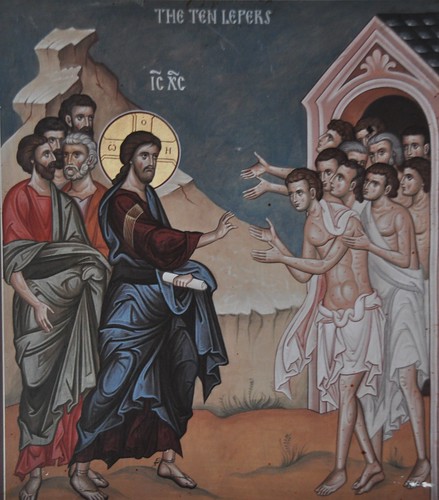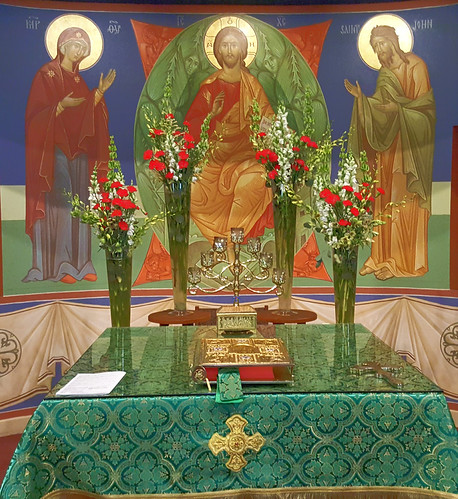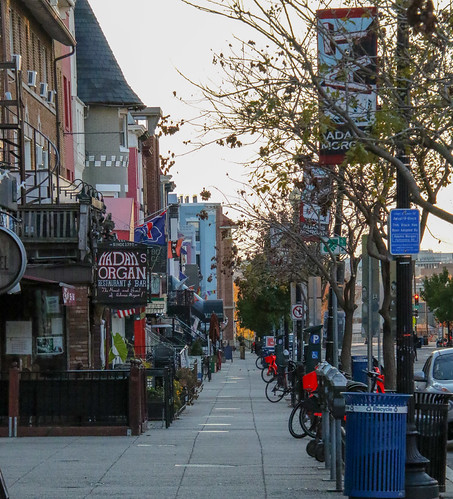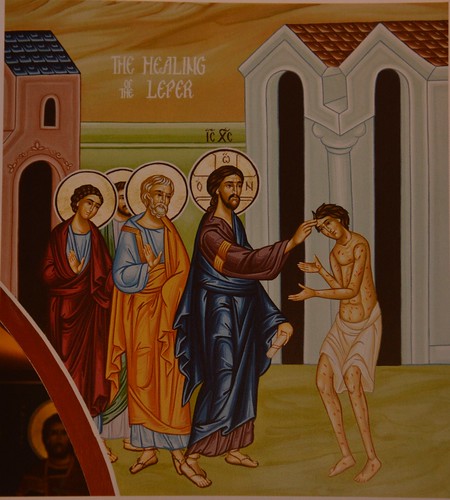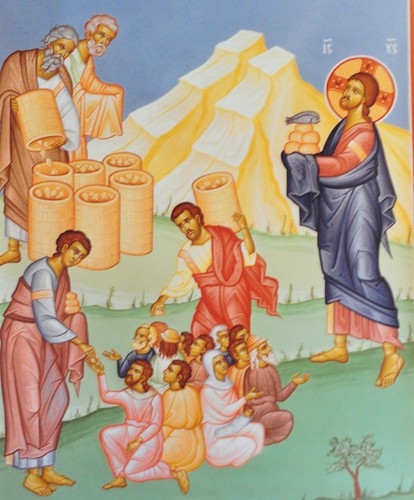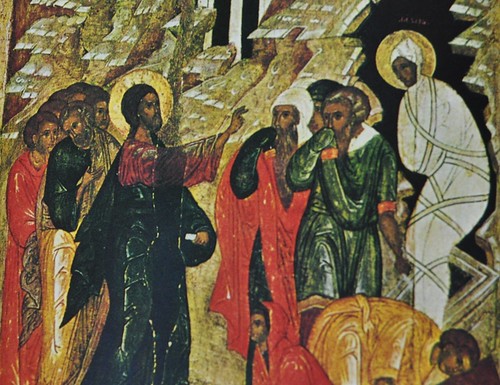Then as He entered a certain village, there met Him ten men who were lepers, who stood afar off. And they lifted up their voices and said, “Jesus, Master, have mercy on us!”
So when He saw them, He said to them, “Go, show yourselves to the priests.” And so it was that as they went, they were cleansed. And one of them, when he saw that he was healed, returned, and with a loud voice glorified God, and fell down on his face at His feet, giving Him thanks. And he was a Samaritan. So Jesus answered and said, “Were there not ten cleansed? But where are the nine? Were there not any found who returned to give glory to God except this foreigner? And He said to him, “Arise, go your way. Your faith has made you well.” (Luke 17:12-19)
In this Gospel lesson we learn about something that Jesus values. Something He expects to find in us. What is it?
Gratitude
Jesus values a heart that is grateful for the blessings it has received.
St. Paul exhorts us to give thanks in every circumstance (1 Thessalonians 5:18). Yet, we often wonder how that is possible. The ancients believed it possible because they saw gratitude as well as happiness as a choice we make in life, not a response to circumstances. They cultivated happiness and gratitude in their inner selves so that they could have them no matter what circumstance they found themselves in. For us on the other hand, we seem to think that happiness and thankfulness come to us from outside ourselves. Thus we blame friends, family, spouses, neighbors, and country when we aren’t happy. We somehow imagine it the job of everyone else to make us happy. In the ancient world, they knew better than that. They knew the truth that happiness and gratitude were a chosen way of life, not dependent on circumstances. Despite all our advances is science and technology, the ancients still knew things we do not. No wonder drug abuse and addiction are so prevalent in our culture. We are demanding the external world make us happy and thankful. We see ourselves as the victim of circumstances, rather than doing the hard work to chose happiness and gratitude as how we want to live and be.
Our God wants us to have an inner disposition of thankfulness. That is one of of our tasks in life. Be people who chose gratitude and happiness as your perspective on the world rather than a reaction to what is happening.
Gratitude means to be thankful for what we have received. In Luke 17:12-19, 9 of the 10 lepers who were healed did not stop and give thanks to Christ. All ten found their voice when they wanted to request something, but only one thought it right to come back and give thanks.
They lacked the virtue of gratitude.
Sadly, giving thanks does not occur automatically even when we receive what we want. All day long most of us are receiving some things that we want, yet we are not thankful for these things. We don’t thank everyone who gives us what we want. We fail to be thankful if we have any food to eat, or a bed to sleep on or clothes to wear. We take it for granted that there should be heat in the buildings and running water and paved roads and the trash removed. We want these things, and when we get them, we feel no gratitude. Thankfulness is not an automatic human response, we have to cultivate it.
Disciples of Christ are to be thankful people. We are to be thankful for everything, even for the things we pay for and also in the times when things fail us.
In the Gospels, we see Jesus Himself giving thanks:
Just before feeding the thousands when He multiplied the loaves and fishes in Matthew 15:36:
he took the seven loaves and the fish, and having given thanks he broke them and gave them to the disciples, and the disciples gave them to the crowds.
Just before raising His friend Lazarus from the dead in John 11:41-42:
So they took away the stone. And Jesus lifted up his eyes and said, “Father, I thank thee that thou hast heard me. I knew that thou hearest me always, but I have said this on account of the people standing by, that they may believe that thou didst send me.”
Christ gave thanks to His Father for the things His Father had hidden and for the things He had revealed in Matthew 11:25-26:
At that time Jesus declared, “I thank you, Father, Lord of heaven and earth, that you have hidden these things from the wise and understanding and revealed them to babes; yes, Father, for such was your gracious will.
And of course, and perhaps most famously, Jesus gave thanks at the Last supper, Matthew 26:27:
And he took a cup, and when he had given thanks he gave it to them, saying, “Drink of it, all of you; for this is my blood of the covenant, which is poured out for many for the forgiveness of sins.
Jesus knew he was going to be murdered. And on that very night in which he knew he was to be betrayed, arrested, denied, tortured and executed, he still sat with His disciples and gave thanks to God!
In imitation of Christ we too give thanks for everything. “Eucharist” means thanksgiving, we thank God for that night in which Jesus was tortured and executed. We join in with the disciples in receiving Christ’s Eucharist at each and every Divine Liturgy. We participate in Christ’s thanksgiving.
Sixty-seven times some form of the word “thanks” appears in the New Testament.
Did the apostles only give thanks only because things were going good for them? NO, they gave thanks in times of suffering as well.
In Acts 5:41, we read:
Then they left the presence of the council, rejoicing that they were counted worthy to suffer dishonor for the name.
 Think of St. Paul and how often he gives thanks to God even though constantly suffering. In Every single letter of St Paul, he offers thanks.
Think of St. Paul and how often he gives thanks to God even though constantly suffering. In Every single letter of St Paul, he offers thanks.
Acts 27:35-36 in the midst of shipwreck and sea disaster St Paul takes time to offer thanks:
And when he had said this, he took bread, and giving thanks to God in the presence of all he broke it and began to eat. Then they all were encouraged and ate some food themselves.
Let your hearts and minds be filled not with complaints, criticisms and accusations against one another but rather be filled with thanksgiving, always for everyone and everything. We should embrace the attitude expressed in the AKATHIST: Glory to God for All Things. And we should remember the words of the Apostle Paul in Philippians 4:6:
Have no anxiety about anything, but in everything by prayer and supplication with thanksgiving let your requests be made known to God.

